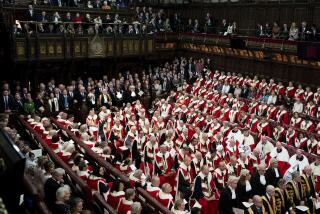Britain to abolish rule of male succession to throne
- Share via
Reporting from London — Good news for the daughter of Britain’s Prince William and Catherine Middleton (if they have one): One day she can be queen.
Leaders of the 16 countries that recognize the British monarch as head of state have agreed that a firstborn daughter ought to be able to ascend the throne even if she has younger brothers. The proposed change to the rule of royal succession that has prevailed for centuries will now make its way through the legal process of all the countries ruled by Queen Elizabeth II, among them Australia, Canada and a number of small island nations (Britain included).
The government leaders of the 16 “realms” are also determined to scrap an antiquated law that forbids the monarch to marry a Catholic but that has nothing against a Hindu, Muslim or Wiccan spouse.
TIMELINE: 100 years of British royal weddings
“The idea that a younger son should become monarch instead of an elder daughter simply because he’s a man or that a future monarch can marry someone of any faith except a Catholic — this way of thinking is at odds with the modern countries that we’ve all become,” British Prime Minister David Cameron said Friday at a conference of Commonwealth countries in Perth, Australia.
He didn’t say whether “modern countries” ought to have unelected dynastic rulers in the first place.
The legislation, whose final approval is widely expected, would apply to all descendants of Prince Charles, the current heir apparent and father of Princes William and Harry. As a practical matter, the rule change would begin with the children of William, second in line to the throne, who wed Middleton, his college sweetheart, in April.
Although ending the sexism of the law of succession has been bandied about for 50 years, the issue has become more urgent since the marriage and the prospect of a new generation of royal progeny.
“The time has come to change the rule so that if the royal couple have a girl rather than a boy, then that little girl will be our queen,” Cameron told reporters. The claim of “that little girl” to the throne would trump that of Prince Harry and of any brothers who came after her.
By coincidence, the theme of this year’s summit of leaders of Commonwealth countries is women as “agents of change.” The queen is attending as head of the Commonwealth, an organization of 54 countries linked to the old British Empire.
As host of the conference, Australian leader Julia Gillard congratulated Cameron on spearheading the move to amend the law of succession, which she appreciated “both as a prime minister and as a woman.” She neglected to add that she’s also an avowed republican who believes that the regal-looking old lady in hat and pearls sitting next to her during the opening ceremony ought to join the ranks of Britain’s unemployed.
A British poll in March showed that 75% of respondents support the abolition of male primogeniture.
Students of the monarchy have had a field day playing “What if?” since the proposed rule change was announced.
Had gender equality been practiced 500 years ago, a dashing young man named Henry Tudor would have had to play second fiddle to his older sister, presumably growing fat in his old age without ever getting to add the letters “VIII” to his name.
More tantalizing, perhaps, is the fact that Queen Victoria’s daughter, who bore the same name, would have ascended the throne on her mother’s death in 1901. The younger Victoria was also the queen of Prussia by marriage, and her son was Kaiser Wilhelm II, who would therefore have gone on to rule over a combined Anglo-German realm.
The consequences for the British are mind-blowing.
“The first and second world wars would never have happened,” the Guardian newspaper wrote, “and we would all be driving top-of-the-range Audis and embracing low levels of personal debt.”
TIMELINE: 100 years of British royal weddings
More to Read
Sign up for Essential California
The most important California stories and recommendations in your inbox every morning.
You may occasionally receive promotional content from the Los Angeles Times.











